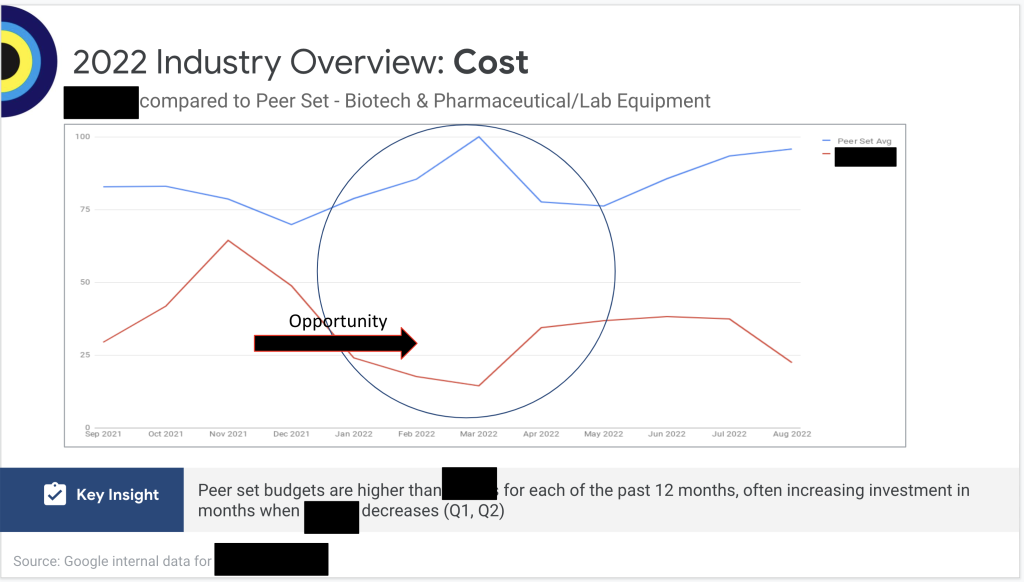It’s hard to believe, but 2022 is already winding down.
Which means that B2B advertisers can take their feet off the gas and relax a bit, right?
Unfortunately, not.
Because these last few months of the year are a critical time in your Google Ads and LinkedIn advertising programs. This is the time to finish the year strong and set yourself up for success in 2023.
With that in mind, here are five action items you should take before the year is done.

1. Plan for 2023 budget efficiencies
Now’s the time to look ahead to 2023 to make sure you’ll get the most from your budget for the new year. And that may mean questioning how you’ve always done things in the past.
For example, we have a client that’s always slow to finalize their advertising budget for the following year. Often, budgets don’t get approved until March. Consequently, their advertising programs are basically on hold in Q1, which opens the door to this client’s competitors.
Here’s what happens:

The red line is our client’s ad spend. The blue line is their competitor’s ad spend.
As you can see, while our client waits for their Q1 budget to get approved, their competitors are capitalizing on their absence in the Google Ads network. Not good!
In working with these clients, we pointed out the impact of their slow budget approval process—and recommended they work to change it and stop handing these opportunities to their competitors.
The moral of the story here? Question everything. Don’t assume that just because you’ve always done things a certain way that’s the only way—or the best way—to do them.
2. Finish 2022 strong
The year isn’t over yet—and you can finish strong by looking for new opportunities.
For example, ad spend often levels off or declines naturally at this time of year in some industries, which gives you an opportunity to fill that void.
And don’t assume that your target market is unreachable over the last couple weeks of the year either. Not everyone celebrates Christmas (news flash!). Many professionals use those last few weeks to catch up on projects and plan for the next year. When they’re searching online for solutions, you want your ad to be there too.
Additionally, if you have a bit of extra budget, this is a great time to test new strategies, ad networks, and formats. For example:
Google Ads Performance Max
We’ve seen a real mixed bag with Performance Max. For some B2B clients, it hasn’t been a good fit at all. But for others, we’re seeing real value.
LinkedIn Ads
People complain that LinkedIn Ads are expensive. And they’re much pricier, on the surface, than Google Ads.
But at the same time, they’re also much more targeted—so you get what you pay for. Again, it’s something to test.
Google Ads
Maybe you’ve given up on Google advertising altogether, concluding that it “just doesn’t work” for your company.
That blanket “it just doesn’t work” conclusion seems unlikely. When Google Ads doesn’t work, there’s usually a good reason, such as:
- Partnering with someone that wasn’t an expert
- Having expectations that didn’t align with budgets
- Adopting the wrong approach or strategy.
So if you’ve sworn off Google Ads because it didn’t work for you last time, maybe now’s the time to circle back to it—and look for a better partner to help you.
3. Refresh your assets
New year, new assets!
Take this time to review your inventory of marketing assets and consider whether they need a refresh. Talk to your creative teams to get penciled into their calendar.
Video, display, and text ads are the most obvious ads to review and update but don’t forget about search ad extensions (now called assets). Now is a great time to review sitelinks, callouts, and structured snippets to ensure they still work individually and as a group.
4. Prepare for changes ahead
Next year is going to bring some big changes to Google advertising, so this is a great time to prepare.
Changes to Google Analytics
Now is definitely the time to talk to your agency and/or internal teams about how you’ll handle the sunsetting of the current version of Google Analytics.
Once GA4 replaces today’s Google Analytics, you’ll lose all your YOY data. You need to do whatever you can to gather that data before it’s gone.
For example, we always send monthly and quarterly reports to our clients, so we’ll be leaning on these past reports when needed. In addition, we’re working to gather new types of data to help round out our arsenals, such as source/medium reporting and sitelink performance reporting.
Changes to video targeting
Google recently announced that it will be removing content targeting settings from video campaigns, such as keyword targeting and placement targeting. Many advertisers rely on these settings, so understanding and planning for this update are important.
5. Look for platform integrations
The PPC industry is in the middle of a mass movement to consolidate customer data across platforms—and now’s the time to get on the bandwagon.
For years, customer data was siloed on different platforms and tools, whether CRMs, email marketing, Google Ads, etc. Marketers did their best to pull this information together, but it was time-consuming (and usually involved lots of spreadsheets).
But things are changing. Google has been building out its APIs so that its platforms can integrate seamlessly with others, such as HubSpot and Salesforce.
And where integrations don’t exist, people are finding solutions with other tools, such as Zapier.
If this isn’t something you’ve looked into yet, now’s the time to have a conversation with your IT team. Connecting these systems may be a massive challenge at first—but the benefits are huge.
Set yourself up for success in 2023
I hope these action items have inspired you to take a fresh look at your Google Ads and LinkedIn advertising programs over the next few weeks.
And if you’d like some help—such as an audit of your existing Google Ads program—feel free to contact us for a no-obligation conversation.






